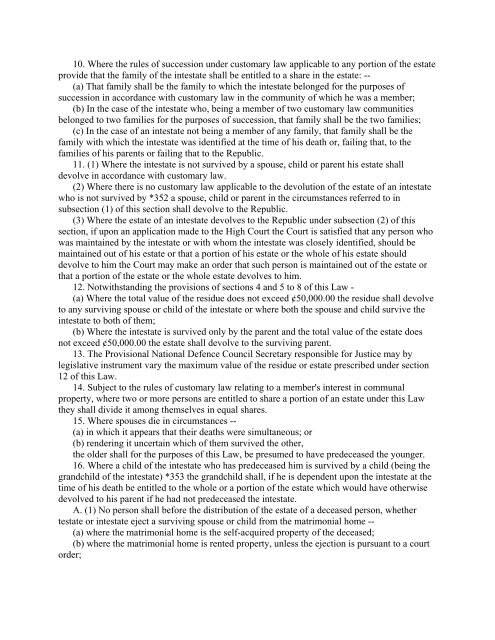Law, Culture and Women's Inheritance Rights in ... - Leitner Center
Law, Culture and Women's Inheritance Rights in ... - Leitner Center
Law, Culture and Women's Inheritance Rights in ... - Leitner Center
Create successful ePaper yourself
Turn your PDF publications into a flip-book with our unique Google optimized e-Paper software.
10. Where the rules of succession under customary law applicable to any portion of the estate<br />
provide that the family of the <strong>in</strong>testate shall be entitled to a share <strong>in</strong> the estate: --<br />
(a) That family shall be the family to which the <strong>in</strong>testate belonged for the purposes of<br />
succession <strong>in</strong> accordance with customary law <strong>in</strong> the community of which he was a member;<br />
(b) In the case of the <strong>in</strong>testate who, be<strong>in</strong>g a member of two customary law communities<br />
belonged to two families for the purposes of succession, that family shall be the two families;<br />
(c) In the case of an <strong>in</strong>testate not be<strong>in</strong>g a member of any family, that family shall be the<br />
family with which the <strong>in</strong>testate was identified at the time of his death or, fail<strong>in</strong>g that, to the<br />
families of his parents or fail<strong>in</strong>g that to the Republic.<br />
11. (1) Where the <strong>in</strong>testate is not survived by a spouse, child or parent his estate shall<br />
devolve <strong>in</strong> accordance with customary law.<br />
(2) Where there is no customary law applicable to the devolution of the estate of an <strong>in</strong>testate<br />
who is not survived by *352 a spouse, child or parent <strong>in</strong> the circumstances referred to <strong>in</strong><br />
subsection (1) of this section shall devolve to the Republic.<br />
(3) Where the estate of an <strong>in</strong>testate devolves to the Republic under subsection (2) of this<br />
section, if upon an application made to the High Court the Court is satisfied that any person who<br />
was ma<strong>in</strong>ta<strong>in</strong>ed by the <strong>in</strong>testate or with whom the <strong>in</strong>testate was closely identified, should be<br />
ma<strong>in</strong>ta<strong>in</strong>ed out of his estate or that a portion of his estate or the whole of his estate should<br />
devolve to him the Court may make an order that such person is ma<strong>in</strong>ta<strong>in</strong>ed out of the estate or<br />
that a portion of the estate or the whole estate devolves to him.<br />
12. Notwithst<strong>and</strong><strong>in</strong>g the provisions of sections 4 <strong>and</strong> 5 to 8 of this <strong>Law</strong> -<br />
(a) Where the total value of the residue does not exceed ¢50,000.00 the residue shall devolve<br />
to any surviv<strong>in</strong>g spouse or child of the <strong>in</strong>testate or where both the spouse <strong>and</strong> child survive the<br />
<strong>in</strong>testate to both of them;<br />
(b) Where the <strong>in</strong>testate is survived only by the parent <strong>and</strong> the total value of the estate does<br />
not exceed ¢50,000.00 the estate shall devolve to the surviv<strong>in</strong>g parent.<br />
13. The Provisional National Defence Council Secretary responsible for Justice may by<br />
legislative <strong>in</strong>strument vary the maximum value of the residue or estate prescribed under section<br />
12 of this <strong>Law</strong>.<br />
14. Subject to the rules of customary law relat<strong>in</strong>g to a member's <strong>in</strong>terest <strong>in</strong> communal<br />
property, where two or more persons are entitled to share a portion of an estate under this <strong>Law</strong><br />
they shall divide it among themselves <strong>in</strong> equal shares.<br />
15. Where spouses die <strong>in</strong> circumstances --<br />
(a) <strong>in</strong> which it appears that their deaths were simultaneous; or<br />
(b) render<strong>in</strong>g it uncerta<strong>in</strong> which of them survived the other,<br />
the older shall for the purposes of this <strong>Law</strong>, be presumed to have predeceased the younger.<br />
16. Where a child of the <strong>in</strong>testate who has predeceased him is survived by a child (be<strong>in</strong>g the<br />
gr<strong>and</strong>child of the <strong>in</strong>testate) *353 the gr<strong>and</strong>child shall, if he is dependent upon the <strong>in</strong>testate at the<br />
time of his death be entitled to the whole or a portion of the estate which would have otherwise<br />
devolved to his parent if he had not predeceased the <strong>in</strong>testate.<br />
A. (1) No person shall before the distribution of the estate of a deceased person, whether<br />
testate or <strong>in</strong>testate eject a surviv<strong>in</strong>g spouse or child from the matrimonial home --<br />
(a) where the matrimonial home is the self-acquired property of the deceased;<br />
(b) where the matrimonial home is rented property, unless the ejection is pursuant to a court<br />
order;


